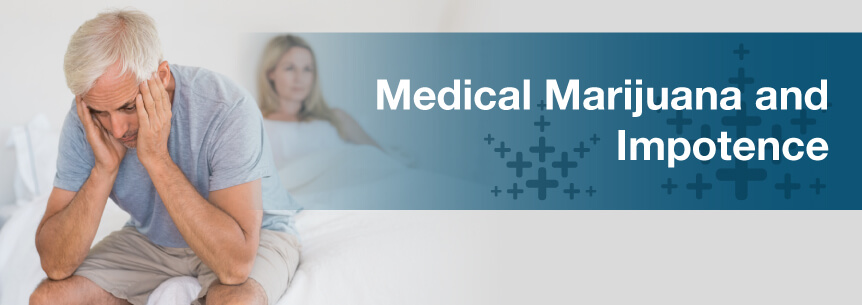
Impotence is a common yet life-altering problem that millions of men suffer from each year. However, it is highly treatable and does not have to be a permanent condition. Doctors now use a variety of methods to treat the many underlying factors that cause impotence today. While more research is needed to explore the relationship between medical marijuana for impotence, some men report having increased sexual stamina from using weed.
For many men, the inability to perform sexually takes a negative toll on many aspects of their lives. They may feel like less of a man and not up to par with their peers, and they also may shun romantic relationships. However, with proper diagnosis, impotence can be easily remedied in many cases.
Discover what impotence is and in what manner doctors can treat it today, including through medical marijuana for impotence.
There’s an association between smoking tobacco and erectile dysfunction since it restricts blood flow to your arteries and veins. Individuals who smoke tobacco have more chances of developing impotence, so many assume this could be the case with smoking cannabis, as well. However, cannabis doctors disagree. According to them, the traditional literature around it isn’t up-to-date, and more research is needed.
For couples with concerns in the bedroom, there’s new research suggesting there’s a positive link between medical marijuana and impotence — it could be the only remedy you need to help with ED. By introducing tetrahydrocannabinol (THC) — a compound found in marijuana — to the body’s endocannabinoid system (ECS), men may be able to resolve any sexual dysfunctions, according to studies.
More and more medical marijuana doctors are starting to notice the therapeutic benefits a light buzz can provide. In many states, patients can legally acquire medical weed for chronic conditions, anxiety, pain management and now, sexual dysfunctions like impotence.
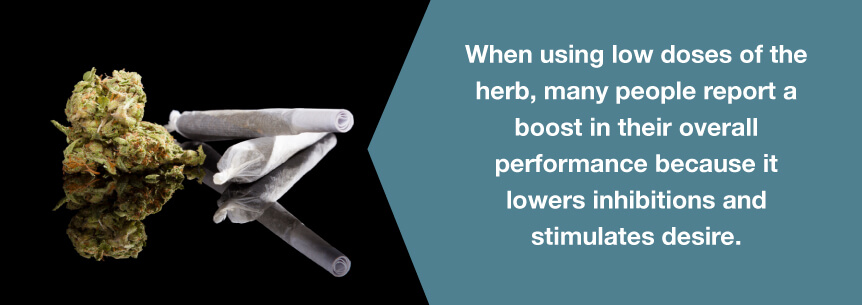
But, researchers argue, like with alcohol, the dose is an essential factor to consider when looking into this drug’s effects. Like alcohol, consuming cannabis in small amounts seems to pose very minimal adverse impacts on sexual performance. When using low doses of the herb, many people report a boost in their overall performance because it lowers inhibitions and stimulates desire. In contrast, when you consume more substantial amounts of marijuana, sexual problems like impotence and difficulty reaching orgasm can often occur.
Find A Doctor Find A Dispensary
Some standard treatments — like vacuum erection devices and Viagra — are first-line treatments for ED or impotence. There are also penile implants and injections. But, some of these therapies — particularly those involving surgical intervention — can remove anatomical structures men require for erection, impair blood supply and damage nerves. Viagra and similar drugs also come with side effects, whereas using medical marijuana for impotence doesn’t have any side effects when done correctly.
Similar to other ailments, psychology often plays a significant role in impotence. Men who have impotence usually get performance anxiety, making it difficult for them to achieve an erection. This is where cannabis for impotence comes in. When an underlying medical ailment isn’t associated with their impotence, medical pot can help some men overcome their performance anxiety and relax, helping them to achieve an erection. It also elevates mood.
Different cannabis strains can have different effects on your body. For instance, the indica strain is more of a “relaxing” strain. Sativa, on the other hand, is a more “stimulating” strain. So, when choosing your cannabis variety, consider these facts and remember — one man’s experience while under the influence of the herb isn’t every man’s experience.
To get you started, here are a few strains you might consider trying:
Experienced weed users typically already know their preferred administration method. They’ve been through their experimenting phase and have found what works best for them. So, if you’re just getting started, you’ll need to do some experimenting of your own.
The various methods of administration include:
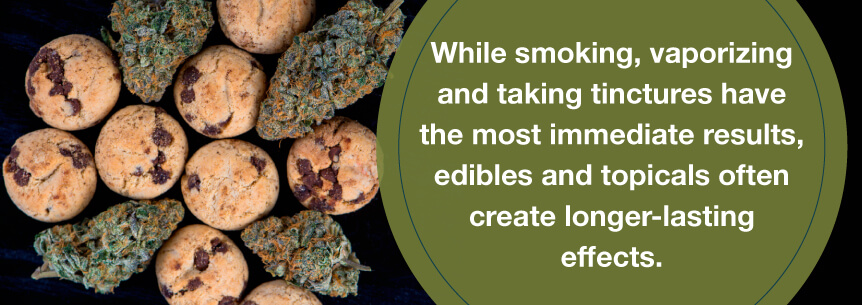
While smoking, vaporizing and taking tinctures have the most immediate results, edibles and topicals often create longer-lasting effects. To get the most out of your medical cannabis for impotence experience, you need to know what you’re looking for from the herb and consider its different effects.
The most important part of deciding to use medical marijuana for ED is finding a qualified medical cannabis doctor and locating a dispensary. By working closely with a professional cannabis doctor, you can build up a cannabis and impotence treatment plan specifically tailored to your particular needs. The staff at the dispensary can also guide you through the process of choosing the right products.
If you’re considering marijuana for impotence, your best bet is to find a solution that will provide you with everything you need all under one roof — and that solution is MarijuanaDoctors.com. Continue browsing our site to begin your search for a qualified doctor, who will help you get your marijuana and impotence treatment plan underway.
Find A Doctor Find A Dispensary
Impotence, also referred to as erectile dysfunction (ED), is defined as the inability to achieve or maintain an erection. A wide array of mental and physical factors can cause this issue, some of which are beyond the sufferer’s control.
The many causes of impotence include:
Certain drugs, like diuretics, statins, beta blockers and some anti-depressants can cause erection issues, too. On the other hand, some high blood pressure medications can improve erectile dysfunction. Alcohol, amphetamines and cocaine can also inhibit a man’s erection.
Advanced Urological Care, P.C. reveals that more than 90 percent of erectile dysfunction cases stem from a physical origin.
Beyond the physical culprits of impotence, performance anxiety in itself — or the notion of a “failure to perform” — can lead to a limp or no erection. Emotional and mental factors, including anxiety, stress and depression, can also lead to impotence. While aging is a risk factor for impotence — an estimated 65 percent of men aged older than 65 experience it — it’s not considered a sure-fire cause of erectile dysfunction. Some men never struggle with impotence even in their 70s, 80s and 90s.
Impotence manifests itself through some symptoms that are difficult to ignore. The primary symptoms of impotence include difficulties in achieving and maintaining an erection. Others can include reduced sexual desire, premature ejaculation and delayed ejaculation. If you experience any of these symptoms — especially when combined with any of the prominent underlying causes for impotence — it’s essential to seek immediate treatment from your primary care doctor or urologist.
The symptoms of impotence may be temporary, chronic or lifelong.
Men who have impotence often report having a less satisfying daily life. They not only are unable to perform in the bedroom with their romantic partner, but they also feel embarrassed about their problem and sometimes feel like they are all alone and have no one to discuss it with. Eventually, they can develop self-esteem and confidence issues that can impact their relationships, careers and mood.
Men with this issue may exhibit different emotions because of their impotence. Some may act angry and aggressive, while others may become introverted and shy away from people — even individuals with whom they have been friends for years. Their emotions may be even more compacted if they are trying to conceive and have a child with a romantic partner. Their inability to impregnate their partners can make them feel anxious, stressful and ashamed.
For men who are not yet in a romantic relationship, impotence may prevent them from dating and seeking out companionship. They may feel like they are not worthy enough to date anyone or be too ashamed to share their problem with someone else. They may even become reclusive and avoid the social scene altogether.
Fortunately for many men with impotence, diagnosing and treating this condition can be relatively simple. Men who think they have this issue should make an appointment with their primary care doctor or urologist to begin diagnostic testing for this condition.
It’s not easy for many men to talk to their doctors about being impotent, but it is more common than many might think. Statistics reported by Cleveland Clinic reveal close to 52 percent of men ages 40 to 70 experience occasional or chronic impotence. A study published in the Journal of Sexual Medicine showed that as many as one in four men under the age of 40 might be seeking treatment for erectile dysfunction, too.
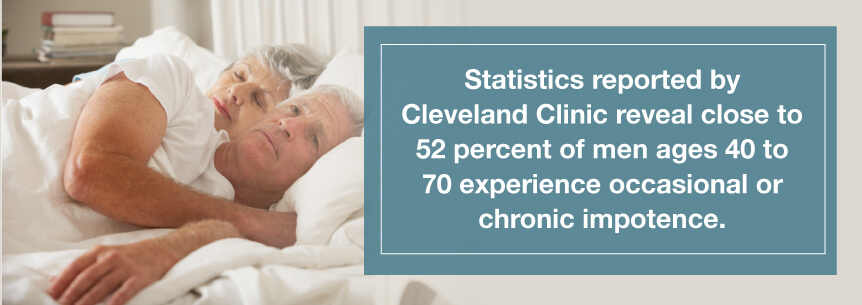
Because it is such a prevalent issue in men’s health today, doctors have designed several different ways to diagnose and treat it.
Because a man’s sexual arousal is a complicated process involving blood vessels, nerves, muscles, hormones, emotions and the brain, diagnosis of erectile dysfunction can also be complicated.
Diagnosing impotence can begin with the patient undergoing a variety of blood and urine tests, which will look for underlying health conditions like high glucose levels, heart disease, cholesterol levels and other factors known to cause impotence. The tests will also determine the patient’s overall testosterone level, which helps indicate if the man suffers from low testosterone — or low T.
Along with blood and urine tests, patients may undergo an ultrasound of their pelvic area. This test will look for damage to the bones, muscles and nerves in the pelvis. If an injury has happened, therapy or surgery could repair it. Likewise, if the ultrasound shows tumors or blockages, the patient may need to undergo surgery to remove them and restore proper functionality in this area.
The last round of tests can include screening for mental and emotional health disorders.
Physicians often recommended one or more treatments for erectile dysfunction. Here are seven of the most common options.
Men with depression, anxiety, rage and stress are often at a higher risk of impotence and may need psychological counseling rather than invasive surgery to treat their impotence. After taking antidepressants or anti-anxiety medications, sufferers may regain their sexual capabilities.
Other treatments for impotence involve the use of oral medications. Some of the most popular impotence medications on the market today include Viagra, Cialis, Levitra, Stendra and Staxyn. If the patient is found to be otherwise healthy and without serious cardiac issues, he may benefit by taking these medicines before engaging in sexual intercourse.
Another course of remedy involves the use of alprostadil, which can be injected at the base of the penis or used as a urethral suppository. This medicine helps men achieve an erection before sexual intercourse.
Vacuum Erection Devices (VED) are a non-invasive treatment method placed over the penis to increase blood flow and engorge the penis mechanically. These non-medicinal impotence treatments can include the use of a pump to encourage the flow of blood to the penis before having sex.
VEDs may be helpful for men who have diabetes, spinal cord injuries, postprostatectomy or arterial insufficiency and are experiencing ED. Some men also prefer to get penile implants that make it easier for them to achieve and maintain an erection.
Doctors also say regular exercise and eating a healthy diet can be useful in treating impotence. Getting enough sleep could be helpful, too. Likewise, avoiding the use of tobacco, alcohol and illicit drugs can also prevent the onset of impotence in men. Participating in relaxation activities, like meditation and yoga, can help some men improve their erections, as well.
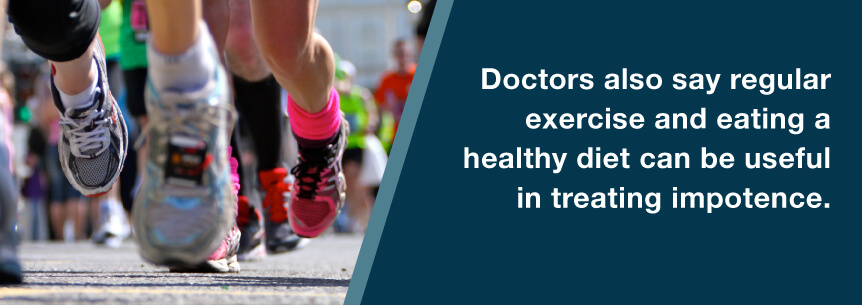
Men who want to avoid prescription medications can try some natural impotence remedies, too. A few popular options include pomegranate juice, ginseng, L-arginine Propionyl-L-carnitine, DHEA and acupuncture.
Remember to always talk to your physician about using natural remedies and taking herbal supplements, as they could interact with any other medications you’re taking.
Some men may require blood vessel surgery to resolve their impotence.
Pharmaceutical companies are researching and testing new treatments for erectile dysfunction, including Uprima and Topiglan. Uprima is an oral tablet dissolved under the tongue, while Topiglan is cream you apply to the penis.